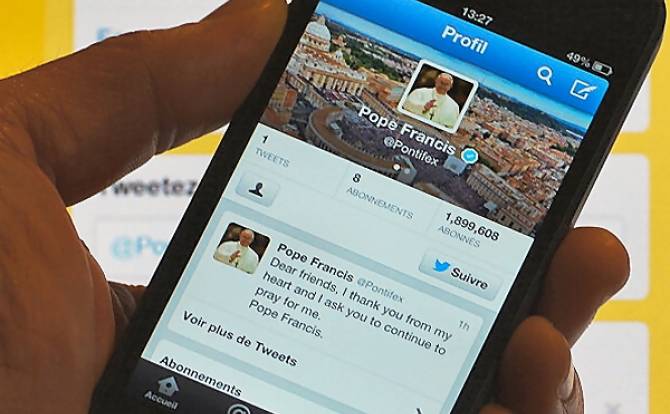-
Walking alongside humanity in the digital world
-

-
Meeting of bishops responsible for Social Communications in Europe’s Bishops’ Conferences
Barcelona, Spain, 8-10 November 2013
New means of social communications are evermore characteristic of society. On the European continent, too, Facebook, Twitter and the other social networks have become privileged places of information and opportunities to weave human relations, especially among young people. They can deeply touch people, bringing to the fore again old and modern forms of languages and methods of communication. Here they raise new opportunities and duties to bring the happy messgae of the Gospel to everyone. Evangelisation also impacts on the symbolism expressed in art and in the relationship between liturgy and architecture. The arrival of Pope Francis has also modified the media’s perception of the Church. #Pontifex has more than ten million followers. And so is it possible to evangelise on the Internet? In the light of the conciliar decree “Inter Mirifica”, published fifty years ago this year, about forty Bishops and delegates for social communications from the Bishops’ Conferences met in Barcelona to discuss the challenges of proclaiming Jesus today.
For three days (8-10 November), forty participants, including bishops and delegates from the Bishops’ Conferences in Europe, discussed the current situation of Church communication in Europe under the heading “Evangelising the soul of Europe”. The meeting, promoted by the CCEE Commission for Social Communications chaired by Mgr José Ignacio Munilla Aguirre, Bishop of San Sebastián, took place in Barcelona thanks to the hospitality of the local Archbishop, Cardinal Lluís Martinez Sistach.
In Barcelona, the participants discussed the challenges facing the Church’s missionary activity today, the communication of Pope Francis, the use of new technologies, the figure of the architect Antonio Gaudì who communicated, particularly in the innovative and sacred architecture of the Sagrada Familia, the beauty of God through the beauty of architecture. As Don Michel Remery, Deputy General Secretary of CCEE, highlighted, Christians in particular are called to communicate well, using all means possible, with particular attention to beauty. Independently from its aim, every truly Christian communication is done above all through the authentic testimony of a relationship experienced with Christ, as demonstrated most beautifully by Pope Francis. In the course of the meeting, participants were also informed about the ways of using new technologies which have radically changed communication in the Archdiocese of Barcelona; and their use, too, in promoting and informing the protesting participants in the ‘manif pour tous’ social movement which came about in France following the French government decision to vote on the law for same-sex marriage and the adoption of children by such couples. Also discussed was the issue of smart phone apps, with testimony from Gustavo Entrala, developer of the smartphone App and especially the PopeApp. All these experiences are sources of inspiration for the participants and show that these means can be clear responses to the challenges facing the Church today.
The keynote address was entrusted to Mgr Claudio Maria Celli, President of the Pontifical Council for Social Communications, who retraced the history of ecclesial magisterium with regard to the Church’s evangelising mission through the means of social communication starting from the conciliar decree, Inter Mirifica.
In an era characterised more and more by the rapid change of forms of communication which involve new langauges of communication, the Church develops attention to and use of the means of social communication to carry out its evenagelising mission. In particular it has to deal with new technologies, achieved with the spread of internet access and the mobile telephone, and with the most modern languages of communication.
The Church is not called to evangelise the internet, but to evangelise on the internet. This is about proclaiming the Gospel with more modern, respectful and effective means of communication. Communication cannot be just a matter of words, but above all charity which is neighbourly to people where they are, in the circumstances of the digital continent, walking alongside them.
Facebook and Twitter are resources which by their widespread diffusion also enable information and a new approach to politics, as highlighted by the testimony of Ludovine de la Rochère, President of “Manif pour tous”, speaking about the experience of French mobilisation en masse.
On the other hand, trans-mediality was the keyword at the heart of the re-thinking of communication in the Archdiocese of Barcelona, as presented by Cardinal Sistach and the director of the Archdiocese Office for Social Communications, Deacon Ramon Ollé. Starting with the traditional diocesan bulletin, local experts knew how to implement a diversified and profound system of religious information which links the ‘traditional’ means of communication and the new technologies, thus responding to the need to adapt suggested content to the different ages of the users.
Mgr Jose Ignacio Munilla, President of the CCEE Commission, focussed on the communication of Pope Francis, in the eight months of his pontificate: his is a profound and simple way of communicating which goes to the very heart of the Christian message. When Pope Francis speaks about the Gospel, he is not speaking about content extraneous to his own life: he is speaking about Something he believes in. At the same time, many people have emphasised the attention he gives to each person. His message is not for the masses, but touches the heart of individual people. So the example of Pope Francis has been an opportunity to reflect on the ways of proclamation: beginning with the methods or rather the faith which the communicator, bishop or not, wishes to communicate.
During the meeting in Barcelona, a presentation on the new website of the Council of European Episcopal Conferences was made to the participants. It has been accessible since Friday at www.ccee.eu.
Finally, participants underlined the importance of meeting with the bishops who carry out the same service in the field of social communications in order to facilitate mutual support in facing common challenges and for the exchange of experiences.





